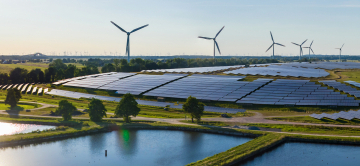Behind its alarming tone, the third part of the IPCC's sixth report on climate change mitigation hides a note of optimism that fundamentally changes the situation: the decoupling of Gross Domestic Product (GDP) growth and greenhouse gas emissions.
No growth without emissions
“We are heading for disaster if we do nothing, but it is not too late if we act quickly”. This is the take-home message of the latest report of the Intergovernmental Panel on Climate Change (IPCC), at least from what the media is saying. Despite the confidentiality maintained until the day of its publication, there is no surprise. The climate emergency is like a seasonal content that the press repeats every time a volume of the report is published (three volumes so far). Journalists simply repeat the articles published in previous editions, updating the statistics, and adding more alarmist adjectives.
Since Volume III of the 2022 report is nearly 3,000 pages long, it is tempting to stick to the summary for policymakers. But Chapter 2, which deals with trends and emission factors, is worth a look because the authors examine the link between growth and greenhouse gas (GHG) emissions. They point out that GDP is the main indicator of the magnitude of emissions, and therefore its growth is accompanied by an increase in GHG emissions: this is the infamous "coupling" between GDP and emissions. This coupling has disastrous consequences since it implies that we cannot have growth without an increase in emissions. Development cannot therefore be "sustainable". It is incompatible with a healthy planet, and there is only salvation in recession. The corollary is that the least developed countries must not catch up with the level of development of the rich countries if we want to avoid an ecological tragedy. With a temperature rise limited to 2 degrees, the poorest cannot claim a standard of living comparable to that of the developed countries.
Absolute and relative decoupling
The good news in the report is that in recent years there has been a decoupling between GDP and GHG emissions. The report points out that many industrialized countries have successfully reduced their GHG emissions per unit of GDP. For example, the European Union reduced the carbon footprint of consumption per unit of GDP by 8% between 1995 and 2015.
The authors distinguish between absolute (reduction per unit of GDP) and relative (decrease in emissions growth per unit of GDP) decoupling, as well as territorial emissions and emissions from population consumption. Between 2015 and 2018, 23 countries achieved absolute decoupling between GDP and territorial emissions, and 14 between GDP and emissions from their consumption. Out of 116 emerging countries, 67 (including China and India) have initiated a relative decoupling. Their growth is no longer linked to an increase in GHG emissions per unit of GDP. The authors observe that decoupling is absolute in rich countries with high per capita emissions, while relative decoupling occurs in some fast-growing countries such as China and India.
The reasons for decoupling
Although the reasons for decoupling are diverse, they lie mainly in the massive investment in renewables (solar and wind) for electricity generation. The report mentions a 56% drop in the cost per kWh produced from photovoltaic panels and a 47% drop in the cost per kWh produced from wind turbines in five years, as well as a 170% increase in production capacity for solar and 70% for wind power worldwide. Other factors are the higher energy efficiency of buildings and in manufacturing. As for the de-industrialization of rich countries, if it has contributed to the decoupling of territorial emissions in the European Union, it does not explain the decoupling of emissions from consumption. And the relative decoupling of emerging countries allows us to hope for a virtuous industrialization, less carbon intensive than it has been for developed countries.
*
* *
According to the established formula, economic development is "sustainable" if it allows future generations to meet their needs. It will not be possible to guarantee a standard of living comparable to that of the rich countries for everyone without drastically reducing the share of GHG emissions in GDP. The decoupling process must therefore be accelerated by investing massively in low-carbon technologies throughout the world, especially in areas of high economic growth.





